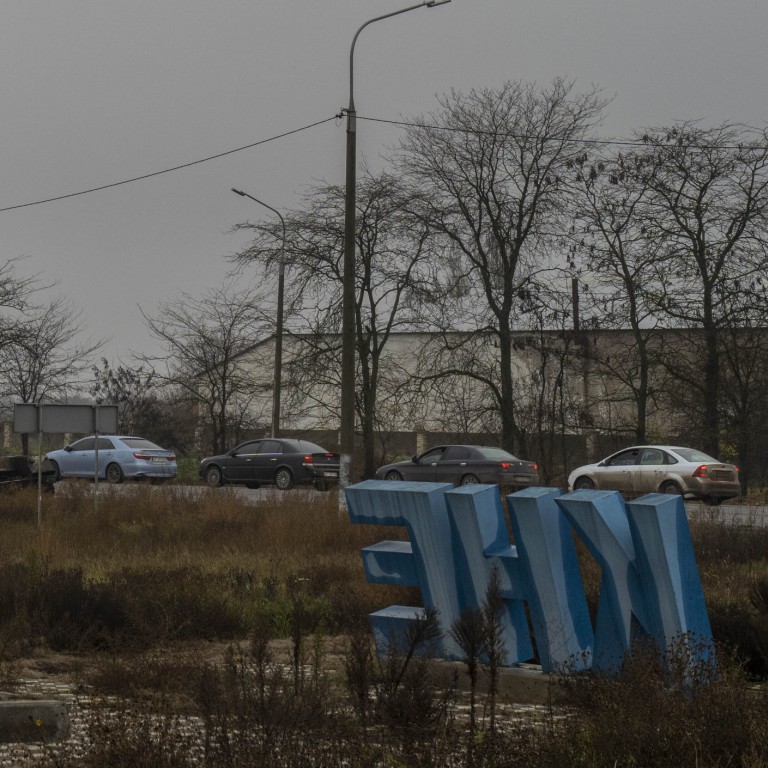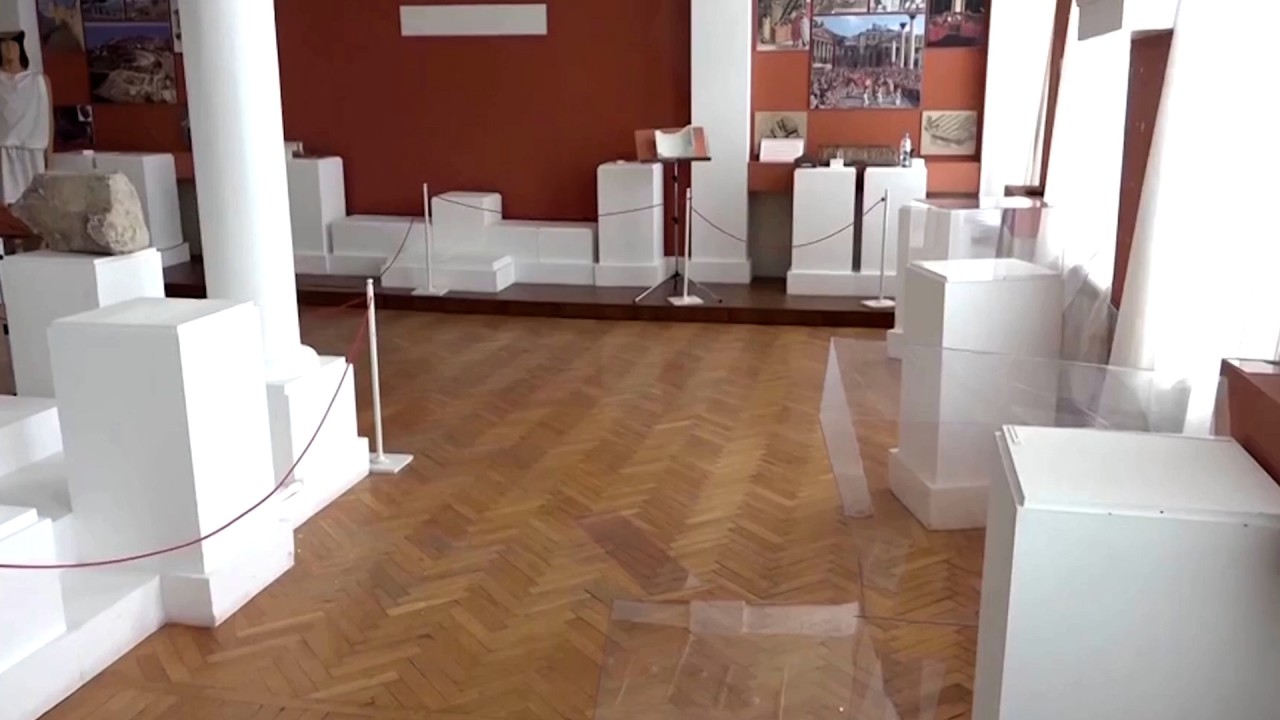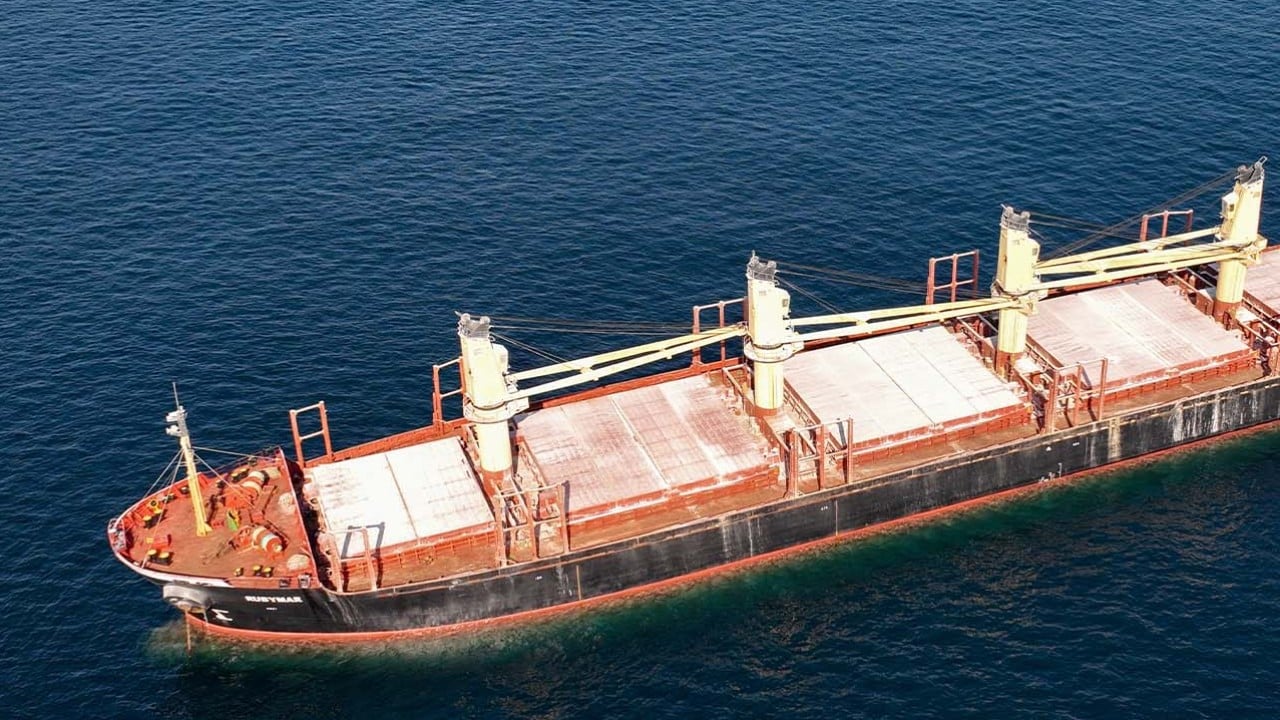
Ukraine: civilians escape Kherson after Russian strikes on freed city, snow to blanket Kyiv
- Exodus came as Ukraine solemnly remembered a Stalin-era famine and sought to ensure Russian strikes don’t deprive others worldwide of its vital food exports
- Heavy snowfall was expected with temperatures dropping below freezing as millions in and around Kyiv remain with little electricity and heat
Fleeing shelling, civilians on Saturday streamed out of the southern Ukrainian city whose recapture they had celebrated just weeks earlier.
The exodus from Kherson came as Ukraine solemnly remembered a Stalin-era famine and sought to ensure that Russia’s war in Ukraine doesn’t deprive others worldwide of its vital food exports.
A line of trucks, vans and cars, some towing trailers or ferrying out pets and other belongings, stretched a kilometre or more on the outskirts of the city of Kherson.
Days of intensive shelling by Russian forces prompted a bittersweet exodus. Many civilians were happy that their city had been won back but lamented that they could not stay.
“It is sad that we are leaving our home,” said Yevhen Yankov, as a van he was in inched forward. “Now we are free, but we have to leave, because there is shelling, and there are dead among the population.”
Poking her head out from the back, Svitlana Romanivna added: “We went through real hell. Our neighbourhood was burning, it was a nightmare. Everything was in flames.”
Emilie Fourrey, emergency project coordinator for aid group Medecins Sans Frontieres in Ukraine, said an evacuation of 400 patients of Kherson’s psychiatric hospital, which is situated near both an electrical plant and the frontline, had begun on Thursday and was set to continue in the coming days.
Ukraine has been facing a blistering onslaught of Russian artillery fire and drone attacks, with the shelling especially intense in Kherson. Often the barrage has largely targeted infrastructure, although civilian casualties have been reported. Repair crews across the country were scrambling to restore heat, electricity and water services that were blasted into disrepair.
Russia has ratcheted up its attacks on critical infrastructure after suffering battlefield setbacks. A prominent Russian nationalist said on Saturday that the Russian military does not have enough doctors, in what was a rare public admission of problems within the military.
In the capital Kyiv, President Volodymyr Zelensky oversaw a busy day of diplomacy, welcoming several European Union leaders for meetings and hosting an “International Summit on Food Security” to discuss food security and agricultural exports from the country. A deal brokered by the UN and Turkey has allowed for safe exports of Ukrainian grain in the Black Sea amid wartime disruptions that have affected traffic.
“The total amount we have raised for ‘Grain from Ukraine’ is already about US$150 million. The work continues,” Zelensky said in his nightly television address. “We are preparing up to 60 ships. All of us together do not just send Ukrainian agricultural products to those countries that suffer the most from the food crisis. We reaffirm that hunger should never again be used as a weapon.”
Ukrainian Prime Minister Denys Shmyhal said Ukraine – despite its own financial straits – has allocated 900 million hryvnia (US$24 million) to purchase corn for countries including Yemen, Sudan, Kenya and Nigeria.
The reminder about food supplies was timely: Ukrainians were marking the 90th anniversary of the start of the “Holodomor” or Great Famine, which killed more than three million people over two years as the Soviet government under dictator Josef Stalin confiscated food and grain supplies and deported many Ukrainians.
German Chancellor Olaf Scholz marked the commemoration by drawing parallels with the impact of the war on Ukraine on world markets. Exports from Ukraine have resumed under a UN-brokered deal but have still been far short of pre-war levels, driving up global prices.
“Today, we stand united in stating that hunger must never again be used as a weapon,” Scholz said in a video message. “That is why we cannot tolerate what we are witnessing: The worst global food crisis in years with abhorrent consequences for millions of people – from Afghanistan to Madagascar, from the Sahel to the Horn of Africa.”
He said Germany, with the UN’s World Food Programme, will provide an additional 15 million euros for further grain shipments from Ukraine.
Scholz spoke as a cross-party group of lawmakers in Germany are seeking to pass a parliamentary resolution next week that would recognise the 1930s famine as “genocide”.
Last year Ukraine and Russia provided around 30 per cent of the world’s exported wheat and barley, 20 per cent of its corn, and over 50 per cent of its sunflower oil, the UN has said.
Snow to blanket Kyiv
In a post on the Telegram social network on Saturday, Kyiv Mayor Vitali Klitschko said more than 3,000 specialists for a local utility continued to work “around the clock” and had succeeded in restoring heat to more than more than 90 per cent of residential buildings. While about one-quarter of Kyiv residents remained without electricity, he said water services had been returned to all in the city.
Heavy snowfall was expected in Kyiv starting on Sunday, with temperatures dropping below freezing day and night, while millions of people who still live in and around the Ukrainian capital remain with little electricity and heat.
Grid operator Ukrenergo said on Saturday that electricity producers were able to cover only three-quarters of consumption needs, necessitating restrictions and blackouts across the country.
President Volodymyr Zelensky said that there are restrictions on the use of electricity in 14 out of Ukraine’s 27 regions and in Kyiv, for “more than 100,000” customers in each of the regions.
Faking Covid outbreak helped Ukraine hospital resist Russian troops
“If consumption increases in the evening, the number of outages may increase,” Zelensky said. “This once again shows how important it is now to save power and consume it rationally.”
Russia’s latest bombardment on Wednesday inflicted the worst damage so far in the conflict, leaving millions of people in Ukraine with no light, water or heat.
Russia says it does not target the civilian population, while the Kremlin said that Moscow’s strikes on energy infrastructure are a consequence of Kyiv being unwilling to negotiate.
Ukraine accuses Russia of ‘terror and murder’ after strike kills newborn baby
In a rare public spat involving Ukrainian leaders, Zelensky on Friday criticised the mayor of Kyiv for doing what he said was a poor job setting up emergency shelters to help those without power and heat after Russian attacks.
Ukrenergo said that blackouts will continue and urged limited use of power.
Snow is expected to continue in Kyiv, a city that had 2.8 million residents before the war, until midweek while temperatures are forecast to stay below freezing.
Additional reporting by Reuters



